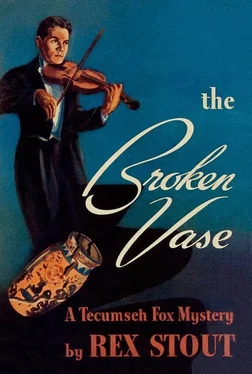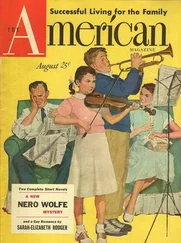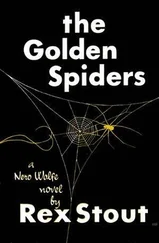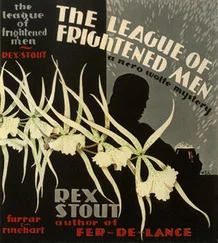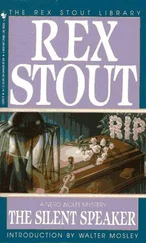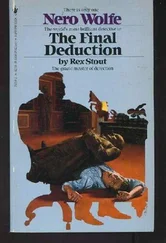“Did he accept?”
“He didn’t get invited. Diego and Koch were there, and my wife isn’t particularly fond of Koch. We stayed perhaps a quarter of an hour and then— What’s that?”
Pomfret jerked erect in his chair to rigid attention. Fox turned his head, ears alert, listened, and turned back again:
“It sounded like a female scream. Someone probably spilled a drink on Miss Heath—”
But Pomfret was on his feet. “Not Miss Heath— I think—”
A bellow came, from a distance and through the door, an urgent resounding bellow, in the bass of Diego Zorilla:
“Fox! Fox! ”
Fox bounded across to the door, jerked it open, and was in the hall; and saw Diego headed for him on the run, with an expression on his face that no drink spilled on Hebe could have accounted for. He braked to a stop.
“Well?” Fox demanded.
“Old Stony Face,” Diego rumbled. “Overlook my excitement. I beg your pardon. I think he’s dead.” He hooked a thumb back over his shoulder. “In there. Would you care to look?”
As Fox moved forward, Henry Pomfret, on a gallop, shot past him; and by the time he had traversed the corridor and reception hall and entered the yellow room, Pomfret had already reached his wife and had an arm around her shoulder, as she leaned against a lacquered table telling the transmitter of a yellow enameled telephone, in a tone more hollow and dreadful than anything Hebe Heath could have produced:
“... Doctor Corbett, at once...”
Other voices, commotion, servants running...
Fox pushed through the huddled guests and knelt beside a prostrate motionless figure on the floor.
The outraged and inquisitive law closed in.
The phone call went to the 19th precinct at 3:36 P.M. At 3:40 a radio car arrived, and at 3:42 a second one. One minute later came a precinct lieutenant with two men; all three entered the building, but shortly the two men emerged onto the sidewalk again and joined a colleague in uniform who was engaged in a heated argument with a woman in a fur coat who was in the driver’s seat of a black sedan drawn up at the curb twenty yards from the entrance to 3070. One of the men energetically dispersed a small crowd of kibitzers that had collected and commanded them to move on; the other, after a short contribution to the argument, climbed to the roof of the sedan, perched there on his knees inspecting a spot near its center, bent over to sniff at it, and straightened to call down:
“Go get a blotter inside there!”
“Get it yourself!” his comrade retorted from the pavement. “I’m finding pieces of glass!” As in fact he was.
At 3:49 a carload of reinforcements, not in uniform, arrived. One took over the argument with the woman in the fur coat; a second clambered to the sedan’s roof to consider the problem presented there; the others scattered to look for pieces of glass and shoo onlookers away. A limousine which tried to approach was held off and tenants of 3070, though enveloped in mink, were ruthlessly compelled to walk an extra thirty steps with no canopy to protect them in case it had suddenly started to rain. At four o’clock another police car swerved to the curb and a man with a black bag got out and hurried into the building. At 4:08 still another arrived and disgorged five men with a variety of kits and paraphernalia; and two minutes later, at 4:10, the chief of staff himself appeared. Followed by two subordinates, he descended from his car in the middle of the street, walked over and accosted a man standing by the black sedan:
“What’s all this?”
“A bottle of whisky thrown from a window up there, Inspector. Hit the top of this car and broke. We’ve gathered up all we can find, and we got a little of the liquid with a medicine dropper—”
“All right, hold everything until I get a look upstairs. Apologize to the lady—”
“Yes, sir, I am. She’s going to report me and see the mayor and sue the city...”
But Inspector Damon of the Homicide Squad had moved on. A large loose-jointed man, with the jaw of a prizefighter and the morose eyes of a pessimistic poet, he did not appear, as he strode into the lobby and headed for the elevators, to feel with an intensity the outrage of the law at finding itself flouted, but in fact he was outraged. Familiar as he was with crime, and willing to accept it as a necessary element in the composition of the metropolitan scene, after twenty years on the New York police force, he was always affronted by its insolent and improper intrusion into circles where it did not belong. So when he entered the richly furnished Pomfret reception hall and accepted the offer of a uniformed policeman to take his hat and coat, he was not only an officer of the law performing his duty, but also a man with a personal grievance. He scowled at a bulk approaching from the right and inquired testily, “Where’s Craig?”
And when he had been conducted into a large chamber with yellow paneled walls and yellow furniture, and across to the far side, he stood and frowned down in silence at a figure stretched out on the floor. A man kneeling there twisted his neck to look up at him, nodded a greeting, returned articles to a black bag that was open beside him, and got to his feet. The inspector turned to another man who had detached himself from a group in the middle of the room, and demanded:
“Well?”
Sergeant Craig looked as if he too felt that crime had its place and it was not here. “It’s about as bad as you could ask for, Inspector,” he said gloomily. “Dead on arrival. Perry Dunham, son of Mrs. Pomfret. Drank whisky with eight other people in the room and collapsed and had convulsions and died. No statement, nothing. The doctor says cyanide poisoning.”
“I said indicated,” the man with the bag interjected. “I’m not going to have—”
“Thank you,” Damon said with peevish sarcasm; and knelt beside the figure on the floor, supported himself with his hands, lowered his face until his nose was all but touching the lips which had recently belonged to Perry Dunham, and sniffed. After another sniff he straightened, scrambled to his feet, started to brush off his knees from force of habit but desisted when he saw there was no need for it, turned to Sergeant Craig and demanded:
“Who the hell threw a bottle of whisky out of the window?”
“I don’t know, sir, we only got here a couple of minutes ago. Lieutenant Wade of the Ninetheenth—”
“Right here, Inspector,” came a voice from a man entering. He advanced briskly. “Arrived at 3:43. Dead on arrival. Four radio men were already here. I was told a whisky bottle had been thrown from a window—”
“Who threw it?”
“I don’t know. There were ten people here to handle, not counting three or four servants, and all I know is Tecumseh Fox told me—”
“Fox! How the devil did he get here?”
“He didn’t get here, he was here.”
“Where is he?”
“In yonder. A room they call the library. I herded them all out of here and got names and addresses.” The lieutenant offered a sheet of paper. “That’s as far as I’ve got, except that I got the glass Dunham drank out of just before he went down. I gave it to Sergeant Craig.”
Damon ran his eye down the list of names and up again, grunted, and turned to the sergeant. “All right, get busy. Give it the works. I want what you find in the pockets. As soon as you have pictures of it send it down for a p.m. Find something that had the poison in it — it could have been either a liquid or a powder. Smell for cyanide and remember the powder doesn’t smell till you wet it. They think they’ve got something down below in a medicine dropper. Get it down to the laboratory, and pieces of the bottle they’ve collected, and that glass he drank out of. Keep two men on the door. Doctor, I’d appreciate a p.m. report as soon as possible.”
Читать дальше
